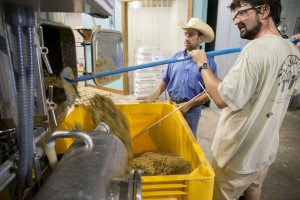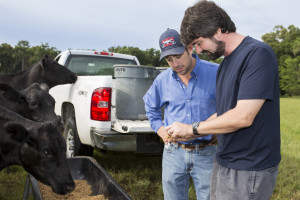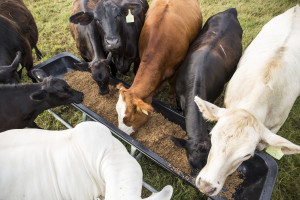UF/IFAS encourages brewers to combine forces with local ranchers
We’ve got 60 living garbage disposals on campus at the University of Florida. They gobble up at least two tons of trash a week from a local business. You might even call it a form of agricultural alchemy: We turn beer (or at least its byproducts) into beef.
UF’s Institute of Food and Agricultural Sciences Beef Teaching Unit feeds its cattle spent brewers’ grain from a local microbrewery.

It’s a money-saver for both parties. First Magnitude Brewing avoids dumping fees. The Beef Teaching Unit gets an economical feed supplement. Nutrition accounts for nearly half the cost of keeping cows on campus, so anything that cuts the food bill makes a difference.

Why it really works, though, is that it reflects the values of both First Magnitude and UF/IFAS. Both organizations are committed to sustainability.
UF/IFAS invests enormous amounts of its intellectual energy and research funding into scientific investigation of how to reduce the environmental impact of food production. Our beer-to-beef deal with First Magnitude allows us to live these values by turning our animals into recyclers.
Our animal feed also includes discarded cottonseed hulls, soybean meal, and citrus pulp.
The brewers’ grains are particularly useful in developing our replacement heifers and supplementing the nutrition of our lactating cows.
We had a similar deal with another local brewery last year. That brewery grew bigger than we could handle, and they moved into bigger space farther from campus, increasing our transport time and costs. So we discontinued it, but we may yet revive that relationship down the road.
What we learned from it, though, prompted our animal sciences chairman Geoff Dahl, to reach out to First Magnitude before it even opened. So from day one last year, they’ve never had to send grains to the dump. Our cows have munched the grains from every batch of Siren Blonde, Ursa IPA and Drift English Mild that John Denny and his chief brewer Eric Dreyer (A UF/IFAS College of Agricultural and Life Sciences grad) have ever made.
The brewing process takes the starches out of the grain for conversion into sugars that get metabolized by yeast during fermentation. From a cattlemen’s perspective, that means the brewer takes out the stuff you don’t want too much of in your feed and results in a high-protein mix with plenty of lipids that the animals can convert into pounds and energy.
IFAS sends a truck over twice a week to pick up the grains.

If you’re a brewer and you haven’t already done so, consider reaching out to your local ranchers.
There might be a way to turn your waste into revenue. You’ll also help another local business or university succeed. And it puts both you and the rancher on a path to more sustainable operations, reducing what goes into local landfills.With more than 1.6 million head of cattle in Florida, chances are good that there’s a rancher somewhere in your vicinity who’d make a great partner.

A pairing of steak and stout may not be for everyone. Whatever the end products, though, the beef and brewing businesses have complementary needs that makes their partnership a contributor to the greening of their communities and the planet.
Jack Payne is the University of Florida’s senior vice president for agriculture and natural resources and leader of the Institute of Food and Agricultural Sciences.


